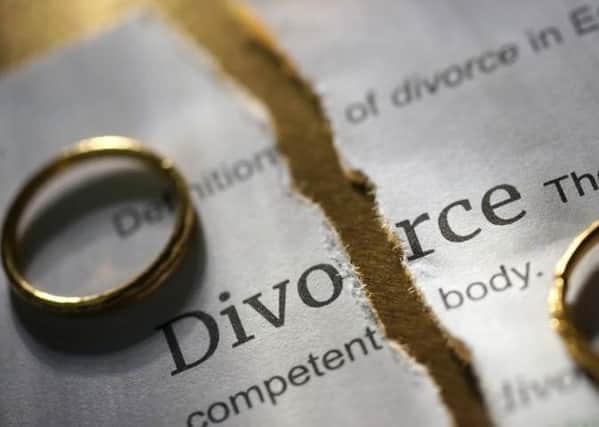Love in the time of coronavirus: divorce rates could soar


It’s believed the rise in divorces was partly caused by the coronavirus outbreak, which forced couples to spend a lot of time in close quarters under quarantine, creating an inflammatory environment for marital conflicts.
This comes as Baroness Shackleton of Belgravia, a distinguisged divorce lawyer whose clients have included Madonna, Paul McCartney, Liam Gallagher and Prince Charles, declared in the House of Lords this week that as in China, the UK may also see a spike in requests for divorce following months of couples living on top of each other during the isolation period.
Advertisement
Hide AdAdvertisement
Hide AdBaroness Shackleton, nicknamed the ‘Steel Magnolia’ for her skills and charm, told peers at Westminster: ‘The prediction amongst divorce lawyers is that following self-imposed confinement it is very likely that the divorce rate will rise. Our peak times are after long exposure during the summer holidays and over Christmas.
“One only has to imagine what it’s going to be like when families are sealed in a property for a long period of time.”
Mindful of this, leading relationship support charity Relate NI has just released advice on its website for maintaining healthy relationships during periods of social distancing and isolation, when living at such close quarters is bound to put strain on even the most solid marital bonds, with unruly children at home, new financial worries and boredom likely to become potential sources of conflict.
Relationships are difficult at the best of times but being cooped up with yout partner in the midst of a global pandemic with nowhere to go can become a pressure cooker environment for buried tensions and resentments.
Advertisement
Hide AdAdvertisement
Hide AdDuane Farrell, chief executive at Relate NI, said: “The worry is that we will see a similar spike in requests for divorce after the self-isolation period as has happened in China. To help adress this, while we have closed our face-to-face counselling sessions amid the pandemic, we have published detailed advice on our website about how couples can make things work in these changed circumstances.
“Practical things like changes in financial situation will be a potentially big pressure point for couples, with many now out of work, applying for benefits or maybe working from home with reduced pay. Children are at home from school, adding to the stress in the family sphere. The big risk is that conflict will increase between families.
“Home schooling, children maybe being upset by the seismic changes to their routine, existential uncertainty, living cheek by jowl 24/7 can create a perfect storm that will put the most precious bonds, that core nucleus of our spouses and children, under new pressure.
“At this time it’s really important for couples to communicate effectively and find their own outlets and interests within government guidelines.
Advertisement
Hide AdAdvertisement
Hide Ad“Healthy relationships are going to be vital in getting us through this crisis.
“Children need to be allowed to express themselves and have the situation explained to them too.
“We need to encourage and empower couples to find a healthy way to resolve conflict. Now more than ever it’s about not taking those relationships for granted.
“The hope is that by practising good communication couples might avoid the higher divorce trends seen in China. But there is no doubt coronavirus could be the final straw for many relationships because self-isolation will increase the pressure on already fraught family dynamics.
Advertisement
Hide AdAdvertisement
Hide Ad“Relate NI’s highly trained counsellors are still ready to help everyone’s relationships via our telephone and webcam counselling services.””
Some advice on how to avoid fall outs as a couple includes: treating each other with kindess, especially when the outside world can feel threatening; thinking about how you can use the extra time you have as a family; try confiding in others outside the family home via online platforms or telephone to avert a marital crisis; if someone says or does something to upset you try counting to ten and take some deep breaths - after this you may no longer feel the need to react; choose your battles and weigh up if they are worth it at this time; remember that children will learn from how you deal with conflict, so keep this in mind when you are all under one roof; understand that with the best will in the world, rows are quite likely in these circumstances - it’s how you deal with them that counts; try to avoid using catastrophizing language which may only foment conflict. Another piece of important advice: even if you feel like your partner is driving you up the walls, remember to feel grateful for any small acts of kindness they perform for you. if you can keep calm and be kind, you can weather this storm together.
“Conversely,” says Farrell, “This quarantine time together could actually bring you all closer together and help couples and families appreciate what they have. “Sometimes crisis situations can actually increase bonding and strengthen unions rather than tear them apart. We hope that will be the case. Northern Ireland may not follow the same divorce trend as China - we’ll have to see.
“Remember that self-isolating isn’t forever. You’re doing it to keep everyone healthy so give yourselves a pat on the back.”
Relate NI will resume its face-to-face services when the current crisis abates, in line with government guidelines.
Visit www.relateni.org.
Comment Guidelines
National World encourages reader discussion on our stories. User feedback, insights and back-and-forth exchanges add a rich layer of context to reporting. Please review our Community Guidelines before commenting.